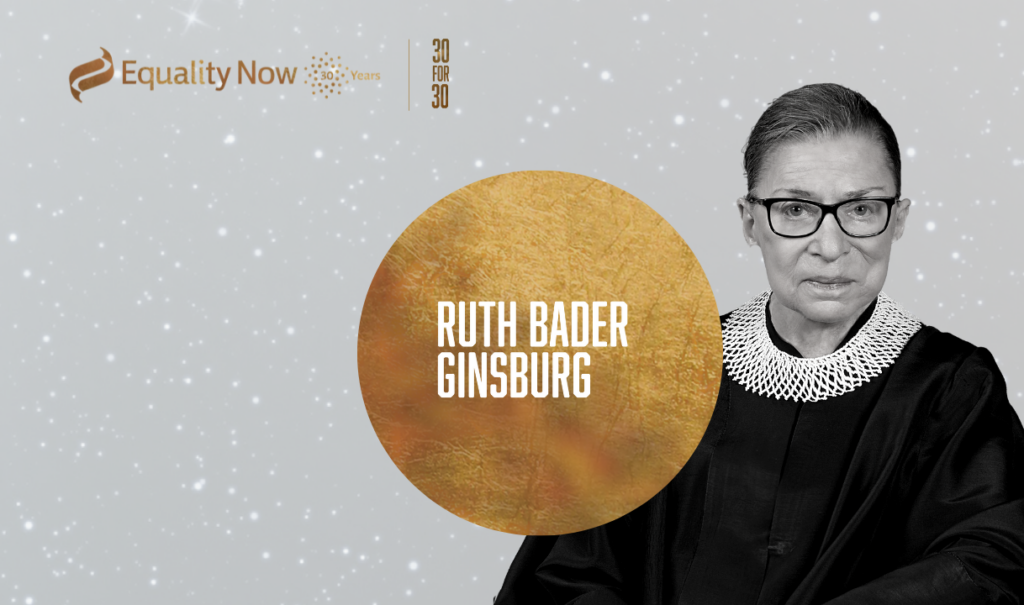Antonia Kirkland, Global Lead, Legal Equality and Access To Justice, celebrates Ruth Bader Ginsburg as part of Equality Now’s 30 for 30, featuring 30 women and changemakers who have played a key role in making equality reality as part of our 30th anniversary celebrations.
In American law and jurisprudence on women’s rights and gender equality, there is perhaps no greater icon than the late Supreme Court Justice Ruth Bader Ginsburg (1933-2020), also known affectionately as RBG.
At Rutgers Law School, where I studied, I used to pass her small faculty portrait in the main hall every day in wonder. She trained a generation of women’s rights lawyers and activists and argued cases before the Supreme Court. Although she left Rutgers long before I arrived, she was a foundational advisor to the first feminist law journal, the Women’s Rights Law Reporter, which I proudly joined and became the Managing Editor of in my third year.
Justice Ginsburg has impacted the work we all do every day in many ways, including supporting the Equal Rights Amendment to the United States Constitution. Although the ERA was not realized in RBG’s lifetime, we are still building on her work as we fight for it today.
In her 2017 opinion in the case of Sessions v. Morales-Santana, RBG footnoted our ‘friend of the court (amici curiae) brief’ on equal nationality rights in international law. The case concerned one of the discriminatory provisions of the Immigration and Nationality Act. In her majority opinion, Justice Ginsburg pointed out that the law was based on flawed assumptions that unwed mothers are the sole guardians of children born outside marriage and on stereotypes that most men care little about children born out of wedlock.
In that case, the court affirmed that sex discriminatory residency requirements for unmarried men violate the equal protection principle. The Court held that “the gender line Congress drew is incompatible” with the Constitution’s guarantee of “the equal protection of the laws” to all.
Different residency requirements based on sex, Justice Ginsburg noted,
“Date from an era when the law books of our Nation were rife with overbroad generalizations about the way men and women are”… and reflected the “once habitual, but now untenable” assumption that “in marriage, husband is dominant, wife subordinate,” while an “unwed mother is the natural and sole guardian of a nonmarital child.”
I’m so proud to be part of a team and to do work that I hope will build on Justice Ginsburg’s legacy of eliminating sex discriminatory laws and enshrining equality in the US Constitution once and for all.

Elizabeth Evatt
Jacqui Hunt, Global Lead, End Sexual Violence, celebrates Elizabeth Evatt as part of Equality Now’s 30 for 30, featurin…
Kimberlé Crenshaw
Jorie Dugan, Legal Advisor, celebrates Kimberlé Crenshaw as part of Equality Now’s 30 for 30, featuring 30 women and c…
Meaza Ashenafi
Faiza Jama Mohamed, Director, Africa Office, celebrates Meaza Ashenafi as part of Equality Now’s 30 for 30, featuring 3…